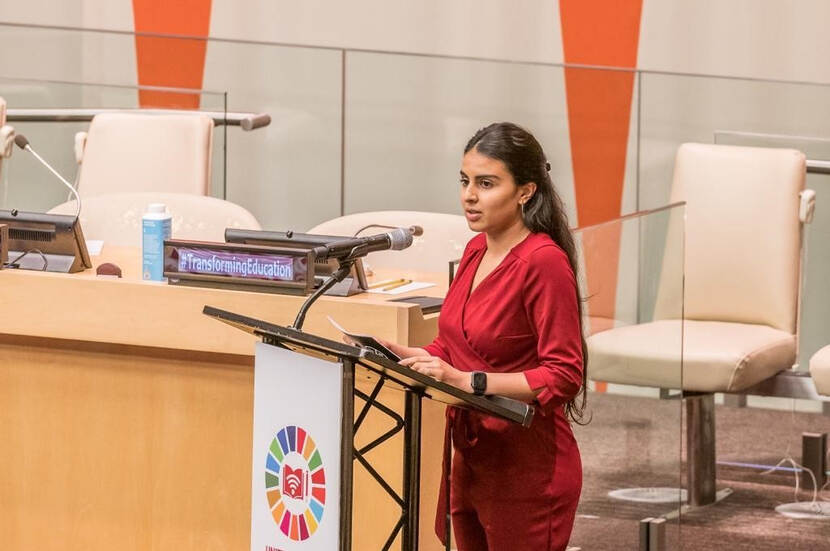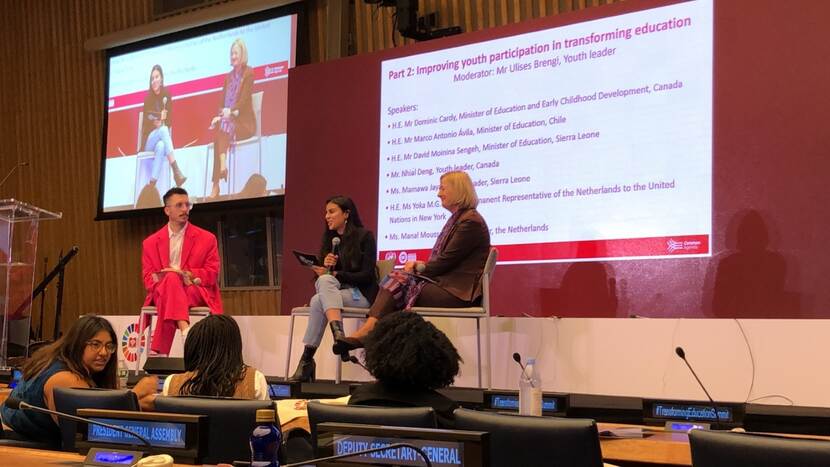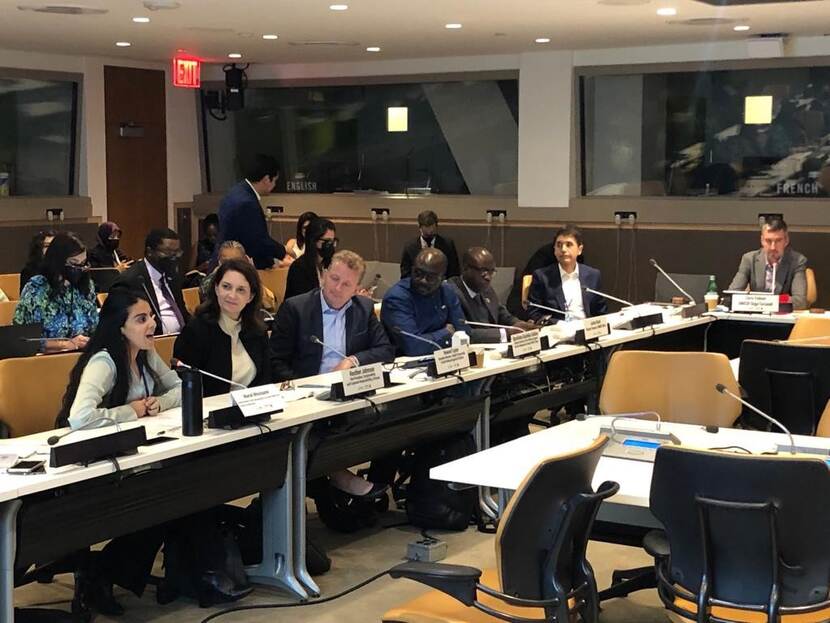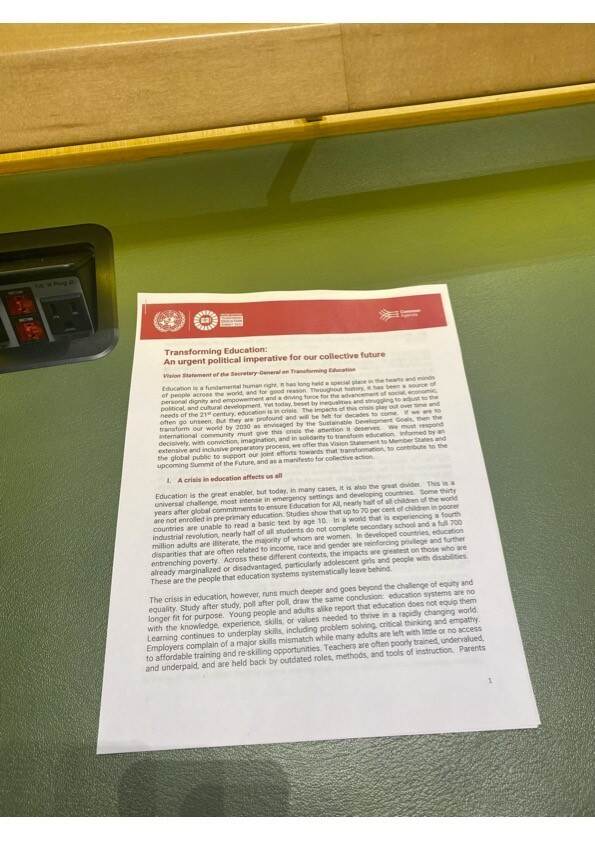The real work takes place outside of the UN building’
‘During the COVID-19 pandemic, there was one thing that all young people agreed upon: the quality of our education is decreasing’, says Manal Moussane, the Dutch United Nations Youth Representative for Human Rights and Security. Manal Moussane attended the Transforming Education Summit in New York.

On 23 October 2020, I became the Dutch United Nations Youth Representative for Human Rights and Security. As a Youth Representative, I have the privilege to speak on behalf of all youth in the Kingdom of the Netherlands for two years, and be a channel for expressing their concerns. During the COVID-19 pandemic, there was one thing that all young people agreed upon: the quality of our education is decreasing. In my public performances, I prioritise expressing young people’s opinions about our education and stress the importance of involving youth in decision making processes.
One year after I started my role as UN Youth Representative, the United Nations Secretary-General announced that the Transforming Education Summit (TES) was going to take place between September 16th and 19th in New York, alongside the United Nations General Assembly, as a response to tackling the worldwide education crisis, but also to make education future-proof.
Attending the pre-summit in Paris (June 28th to June 30th 2022) made me realize that transforming our education system is the only way to equip the next generation with the right tools to handle our global education crisis.
Transforming Education Summit 16, 17 & 19 September 2022
16 September: ‘Mobilization day’
Between 16-19 September, I attended the Transforming Education Summit in New York. The first day of the Summit, ‘mobilization day’, aimed to mobilize different levels of society to take part in transforming our education system. It was great to see youth, NGO’s, member states, Civil Society Organizations taking part in the Summit. I could observe a real effort to include young people in ongoing conversations: youth were represented at different side-events – either as attendees, moderators and/or part of panels where they had an equal voice to non-youth speakers.
I was part of a fire-side chat with Joke Brandt (the Dutch Permanent Representative to the United Nations), in which she shared her speaking slot with me. We decided to step away from the usual format (which normally includes statements that are prepared beforehand), because we realized that having a real and honest conversation is what makes a session about the need to transform education more valuable.
Permanent Representative Brandt created space for me to talk about an instrument I had been working on a lot last year: the United Nations Generational Test. This is an assessment tool that will measure the impact of UN policies on current and future generations before implementation.
Read more about the United Nations Generational Test.
During our chat, Permanent Representative Brandt shared her opinion about the test and allowed me to share the next steps with the audience. This is what truly meaningful youth participation means to me: being given a seat at the table and an equal voice during a conversation about a topic that impacts my life.

17 September: Solutions Day
This was the day I was most excited about. I was all ears during different sessions, waiting to hear some concrete steps about how we want to transform our education systems. I took part in a few side events and heard interesting perspectives about financing education and digitalization from, amongst others, the World Bank, UNICEF, and other NGOs.
Digitalization is one of the topics I have often discussed with Dutch youth during my mandate. During several side-events, I was able to share their inputs about digitalization. Dutch youth pointed out three important lessons about digitalization to me during our conversations;
- Youth were never taught about the risks of the internet, and their potential harmful effects on our education systems;
- Youth aren’t taught about their digital rights (like being able to ask for the removal of data);
- Young people have never been engaged in policymaking processes concerning the usage of the internet in their education systems.

One event that left a mark with me, personally, was about GIGA. GIGA is an initiative that aims to connect all schools worldwide to the internet by 2030. During a panel session, I spoke about the concerns that young people have when it comes to digitalization. I spoke about cyberbullying, burn-outs, an overload of information and sexual harassment online. It was amazing to see how the conversation, before my intervention, had mainly focused on all the positive sides of the internet.
After my intervention, the downside of the internet was considered as well. I suggested that the GIGA team should consider developing a guide for schools that they wish to connect with the internet, and assured the organizers that young people would be keen to give suggestions for the guideline.
Leaders Day (19 September)
After two days that scored high on the meaningful-youth-participation index, the last day was rather disappointing: ‘young-people party’ seemed over once ‘Leaders Day’ started. Many of my fellow youth representatives were left without passes to enter the building, and speaking during any of the sessions was practically impossible. This has always been the biggest struggle that we face as young people. Creating a solid division between young people and ‘high-level people’ is not youth-inclusive or meaningful participation.
Lucky for me, the permanent mission of the Kingdom of the Netherlands arranged that I could be part of the statement of the Kingdom. Together with the Prime Minister of Aruba, Ms. Evelyn Wever-Croes, I shared the vision of young people in the Kingdom of the Netherlands: 1. Equal chances for everybody, 2. Gender transformative education (and comprehensive sexuality education) as well as 3. Skills development.
I dedicated a part of my speech to all the leaders in the room, asking them why the young people in their countries weren’t present. I believe my message came through, so let’s see what they will do next time.
The Way Forward
To conclude the Transforming Education Summit, the Secretary-General shared a vision statement with all attendees of the Summit.
This Statement contains a vision for what we would like our education systems to look like, but also captures what we are striving for. It is now upon member states, organizations and young people to provide concrete steps for how we wish to achieve that vision statement.

In addition to the SG’s Vision Statement, the Secretary-General's Envoy on Youth paired up with young people worldwide and presented a first-of-its-kind ‘Youth Declaration’. In this Youth Declaration, I found the commitments and demands that I was hoping to encounter in the national commitments made on behalf of the Member States.
I am more than curious to see how countries will transform their education systems, and how they will meaningfully include young people in that process. As the Dutch UN Youth Representative, I will continue to work on the UN-generational test as a tool to meaningfully include all generations and to make sure policies contain a long-term vision.